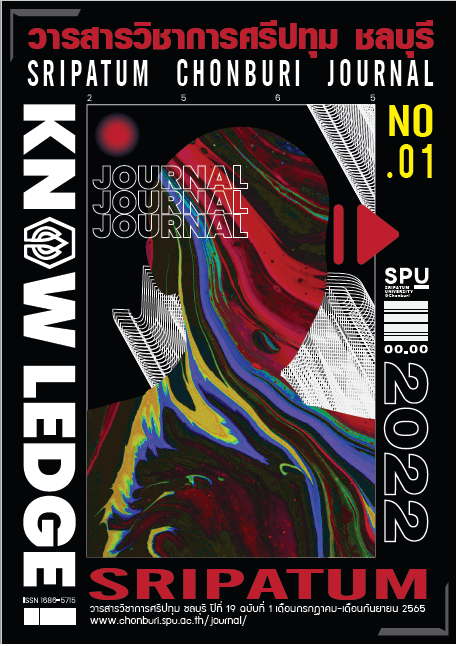FACTORS INFLUENCING WORK EFFICIENCY OF PRIVATE COMPANY EMPLOYEES IN BUSINESS DISTRICTS IN BANGKOK AREA UNDER THE SITUATION OF THE EPIDEMIC OF THE COVID-19 VIRUS
Keywords:
Risk perception, Perception of changes, Happiness at work, Work efficiencyAbstract
This study aims to investigate the factors influencing work efficiency of the private company employees in business districts in Bangkok area under the situation of the epidemic of the Covid-19 virus. The samples in this study were 400 private company employees in business districts in Bangkok area. The questionnaires were used as a data collection tool. The research hypothesis test used a differential analysis by using one-way analysis of variance statistics and statistical analysis of multiple regression equations with a statistically significant level of .05. The hypothesis testing results showed that 1) Employees with personally different status, education, income, position, and years of experience (in present workplace) had different work efficiency at the .05 significant level, 2) Perception of risk factors under the COVID-19 situation in terms of implementation, social activities, and health and high security had a decreasing influence on work efficiency of the private company employees in business districts in Bangkok area, with an overall predictable level of 48.10%, 3) Perception of organizational change factors under the COVID-19 situation in terms of management policies and high working environment had a decreasing influence on the employees’ work efficiency, with an overall predictable level of 57.40%, and 4) Happiness factors under the Covid-19 situation in terms of job satisfaction, acceptance, flexibility in working, and work motivation had a decreasing influence on the employees’ work efficiency, with an overall predictable level of 74.30% with a statistical significance at the .05 level.
References
กรมควบคุมโรค. (2564). สถานการณ์โรคติดเชื้อไวรัสโคโรนา 2019 (COVID-19) มาตรการสาธารณสุข และปัญหาอุปสรรคการป้องกันควบคุมโรคในผู้เดินทาง
(ออนไลน์). เข้าถึงได้จาก: https://ddc.moph.go.th/uploads/ckeditor2//files/1)%20%E0%B8%A7%E0%B8%B4%E0%B9%80%E0%B8%84%E0%B8%A3%E0%B8%B2%E0%B8%B0%E0%B8%AB%E0%B9%8C%E0%B8%AA%E0%B8%96%E0%B8%B2%E0%B8%99%E0%B8%81%E0%B8%B2%E0%B8%A3%E0%B8%93%E0%B9%8C%20covid%20(15%20%E0%B8%A1%E0%B8%8464cp).pdf [2564, 8 มิถุนายน].
กานต์ดนัย ชลสุวัฒน์ และธนินท์รัฐ รัตนพงศ์ภิญโญ. (2562). การรับรู้สาเหตุของการเปลี่ยนแปลงองค์การที่ส่งผลต่อพฤติกรรมการต่อต้านการเปลี่ยนแปลงและกลยุทธ์
การจัดการเพื่อเปลี่ยนแปลงและพัฒนาองค์การ: กรณีศึกษา บริษัท A จำกัด. Veridian E-Journal, Silpakorn University. Humanities, Social Sciences and
arts, 12(4), pp. 1227-1243.
เจษฎา นกน้อย. (2560). พฤติกรรมองค์การ. กรุงเทพฯ: สำนักพิมพ์จุฬาลงกรณ์มหาวิทยาลัย.
เฉิดศักดิ์ สืบทรัพย์ และณัฎฐพันธ์ เขจรนันทน์. (2557). แนวทางการจัดการด้านความปลอดภัยในการทำงานเพื่อส่งเสริมคุณภาพชีวิตของพนักงานในสถานประกอบการ
อุตสาหกรรมเครื่องทำความเย็นไทย. วารสารสมาคมนักวิจัย, 19(2), หน้า 68-80.
ธิดารักษ์ ลือชา และกฤษฎากรณ์ ยูงทอง. (2560). ความสุขในการทำงาน: ความหมายและการวัด. วารสารราชภัฎเพชรบูรณ์สาร, 19(2), หน้า 9-18.
นันทา สู้รักษา. (2544). เอกสารประกอบการสอนวิชา จิตวิทยาทั่วไป. กรุงเทพฯ: ภาควิชาการแนะแนวและจิตวิทยาการศึกษา มหาวิทยาลัยศรีนครินทรวิโรฒ
ประสานมิตร.
บุญเลิศ กมลชนกกุล. (2563). 5 กุญแจสำคัญเพื่อรับมือโลกหลังวิกฤตโควิด-19 ของกลุ่มธุรกิจธนาคารและตลาดทุน (ออนไลน์). เข้าถึงได้จาก:
https://www.pwc.com/th/en/pwc-thailand-blogs/blog-20200826.html [2564, 30 กันยายน].
ปัทมาพร ท่อชู. (2539). การพัฒนาประสิทธิภาพการทำงาน (ออนไลน์). เข้าถึงได้จาก:
http://www.thailandindustry.com/indust_newweb/onlinemag_preview.php?cid=771 [2564, 6 มิถุนายน].
พัชรนันท์ กลั่นแก้ว. (2552). วิธีปรับตัวขององค์การรองรับความเปลี่ยนแปลง (ออนไลน์). เข้าถึงได้จาก:
https://www.tpa.or.th/publisher/pdfFileDownloadS/FQ%20138%20p40-44.pdf [2564, 6 มิถุนายน].
ไพศาล ไกรสิทธิ์. (2557). ความแตกต่างของมนุษย์ (ออนไลน์). เข้าถึงได้จาก: http://paisarnkr.blogspot.com/2014/05/blog-post_26.html [2564, 30
มิถุนายน].
วิทยา อินทร์สอน, ปัทมาพร ท่อชู และสุรพงศ์ บางพาน. (2539). การบริหารความเสี่ยงในองค์กร (Enterprise Risk Management: ERM) (ออนไลน์). เข้าถึงได้จาก:
http://www.thailandindustry.com/onlinemag/view2.php?id=553§ion=1&issues=26 [2564, 30 มิถุนายน].
วีรินทร์ ศิริพันธ์. (2564). วิกฤตโควิด 19 บทพิสูจน์ความยั่งยืนขององค์กร (ออนไลน์). เข้าถึงได้จาก: http://www.thai-iod.com/th/publications-detail.asp?
id=596 [2564, 6 มิถุนายน].
ศรุตานนท์ ชอบประดิษฐ์. (2563). วิกฤตโควิด 19 ส่งผลกระทบต่อการเปลี่ยนแปลงทางสังคมอย่างไร. วารสารชัยภูมิปริทรรศน์, 3(2), หน้า 1-14.
ศิรินันท์ กิตติสุขสถิต, กาญจนา ตั้งชลทิพย์, สุภรต์ จรัสสิทธิ์, เฉลิมพล สายประเสริฐ พอตา บุนยะตีรณะ และวรรณภา อารีย์. (2555). คู่มือการวัดความสุขด้วยตนเอง
HAPPINOMETER. นครปฐม: สถาบันวิจัยประชากรศาสตร์และสังคม มหาวิทยาลัยมหิดล.
สถาบันวิจัยเพื่อการพัฒนาประเทศไทย (ทีดีอาร์ไอ). (2563). ผลกระทบของการทำงานที่บ้าน (Work from home) ในช่วงโควิด-19: กรณีศึกษาของทีดีอาร์ไอ
(ออนไลน์). เข้าถึงได้จาก: https://tdri.or.th/2020/05/impact-of-working-from-home-covid-19/ [2564, 14 มิถุนายน].
สวนา พรพัฒน์กุล. (2521). จิตวิทยาทั่วไป. กรุงเทพฯ: มหาวิทยาลัยศรีนครินทรวิโรฒ ประสานมิตร.
สำนักงานปลัดกระทรวงพาณิชย์. (2563). โลกภายหลัง COVID-19 ผลกระทบด้านเศรษฐกิจและสังคม (ออนไลน์). เข้าถึงได้จาก:
http://mocplan.ops.moc.go.th/ewt_dl_link.php?nid=475f [2564, 1 พฤศจิกายน].
สำนักงานสถิติแห่งชาติ . (2563). การสำรวจผลกระทบจากสถานการณ์การแพร่ระบาดของโรคโควิด 19 ด้านเศรษฐกิจ (ออนไลน์). เข้าถึงได้จาก:
http://ittdashboard.nso.go.th/img/covid/result_COVID-eco.pdf [2564, 1 พฤศจิกายน].
สุภาวดี ทองบุญส่ง. (2556). ปัจจัยบางประการที่ส่งผลต่อความสุขในการทำงานของบุคลากรสังกัดสำนักงานอัยการสูงสุด. ปริญญานิพนธ์การศึกษามหาบัณฑิต สาขา
การวิจัยและสถิติทางการศึกษา, บัณฑิตวิทยาลัย มหาวิทยาลัยศรีนครินทรวิโรฒ.
หทัยวรรณ ฉมังลาภ. (2556). ปัจจัยด้านการรับรู้ความเสี่ยงที่มีผลต่อพฤติกรรมการทำงานของพนักงานระดับปฏิบัติการในสวนอุตสาหกรรมโรจนะ จังหวัด
พระนครศรีอยุธยา. ปริญญานิพนธ์บริหารธุรกิจมหาบัณฑิต สาขาการจัดการ, บัณฑิตวิทยาลัย มหาวิทยาลัยศรีนครินทรวิโรฒ.
AmarinTV. (2563). เปิดผลสำรวจผลกระทบช่วงโควิด-19 พบดัชนีความสุขลดลงกว่าครึ่ง (ออนไลน์). เข้าถึงได้จาก:
https://www.amarintv.com/news/detail/35818 [2564, 1 พฤศจิกายน].
Taro, Yamane. (1973). Statistics: An introductory analysis (3rd ed.). New York, NY: Harper & Row.
Downloads
Published
Issue
Section
License

This work is licensed under a Creative Commons Attribution-NonCommercial-NoDerivatives 4.0 International License.
บทความทุกบทความเป็นลิขสิทธิ์ของวารสารวิชาการศรีปทุม ชลบุรี



